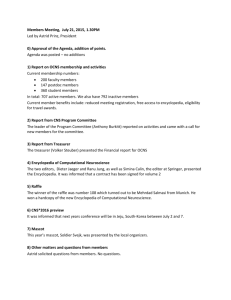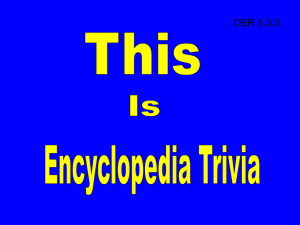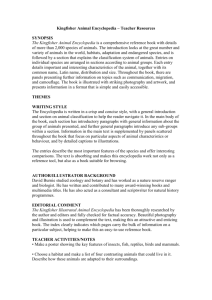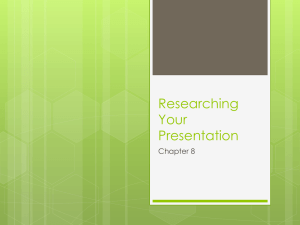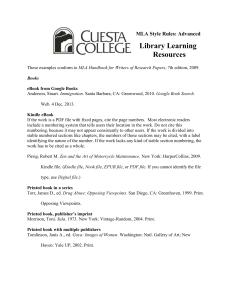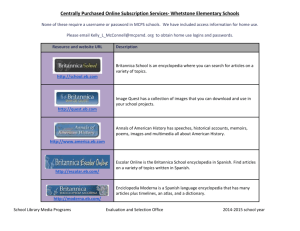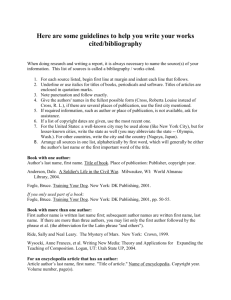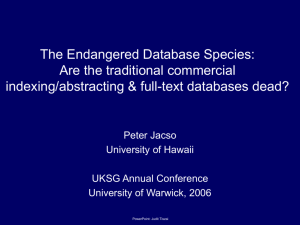Virtual Reference Service and Disservice
advertisement
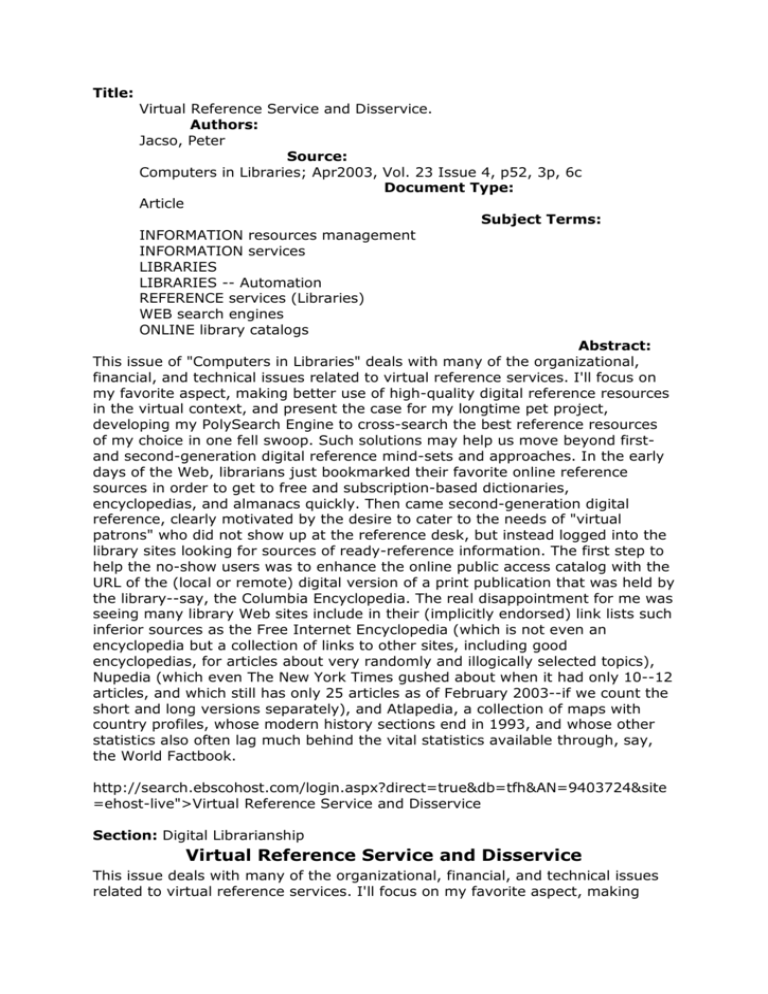
Title: Virtual Reference Service and Disservice. Authors: Jacso, Peter Source: Computers in Libraries; Apr2003, Vol. 23 Issue 4, p52, 3p, 6c Document Type: Article Subject Terms: INFORMATION resources management INFORMATION services LIBRARIES LIBRARIES -- Automation REFERENCE services (Libraries) WEB search engines ONLINE library catalogs Abstract: This issue of "Computers in Libraries" deals with many of the organizational, financial, and technical issues related to virtual reference services. I'll focus on my favorite aspect, making better use of high-quality digital reference resources in the virtual context, and present the case for my longtime pet project, developing my PolySearch Engine to cross-search the best reference resources of my choice in one fell swoop. Such solutions may help us move beyond firstand second-generation digital reference mind-sets and approaches. In the early days of the Web, librarians just bookmarked their favorite online reference sources in order to get to free and subscription-based dictionaries, encyclopedias, and almanacs quickly. Then came second-generation digital reference, clearly motivated by the desire to cater to the needs of "virtual patrons" who did not show up at the reference desk, but instead logged into the library sites looking for sources of ready-reference information. The first step to help the no-show users was to enhance the online public access catalog with the URL of the (local or remote) digital version of a print publication that was held by the library--say, the Columbia Encyclopedia. The real disappointment for me was seeing many library Web sites include in their (implicitly endorsed) link lists such inferior sources as the Free Internet Encyclopedia (which is not even an encyclopedia but a collection of links to other sites, including good encyclopedias, for articles about very randomly and illogically selected topics), Nupedia (which even The New York Times gushed about when it had only 10--12 articles, and which still has only 25 articles as of February 2003--if we count the short and long versions separately), and Atlapedia, a collection of maps with country profiles, whose modern history sections end in 1993, and whose other statistics also often lag much behind the vital statistics available through, say, the World Factbook. http://search.ebscohost.com/login.aspx?direct=true&db=tfh&AN=9403724&site =ehost-live">Virtual Reference Service and Disservice Section: Digital Librarianship Virtual Reference Service and Disservice This issue deals with many of the organizational, financial, and technical issues related to virtual reference services. I'll focus on my favorite aspect, making better use of high-quality digital reference resources in the virtual context, and present the case for my longtime pet project, developing my PolySearch Engine to cross-search the best reference resources of my choice in one fell swoop. Such solutions may help us move beyond first- and second-generation digital reference mind-sets and approaches. A Look at the First and Second Generations In the early days of the Web, librarians just bookmarked their favorite online reference sources in order to get to free and subscription-based dictionaries, encyclopedias, and almanacs quickly. These were usually good-quality sources, as librarians themselves used them. Librarians also happily shared the URLs of the relevant sites with their patrons if they cared to know. Then came secondgeneration digital reference, clearly motivated by the desire to cater to the needs of "virtual patrons" who did not show up at the reference desk, but instead logged into the library sites looking for sources of ready-reference information. These patrons could even have been in the library but sitting at the terminals, not waiting in line for their turn at the reference desk. From the reference librarians' perspective, they were no-shows. The first step to help the no-show users was to enhance the online public access catalog with the URL of the (local or remote) digital version of a print publication that was held by the library--say, the Columbia Encyclopedia. This was fine but not prominent enough; more importantly, it was not applicable for the Web-born ready-reference resources that had no print counterparts, or at least none at the library. Librarians found a good compromise by listing such resources on a special Web page on the library site, indicating if a source was generally available for the public or only for a select group of people (like card-carrying members). Many libraries and independent information professionals have been offering superb link collections to high-quality reference sources for years. I paid homage to many of them in the May 2001 issue of Computers in Libraries. The problems emerged when lay people (sometimes well-intentioned but lacking competence) posted lists that included any warm body--er, resource--that touted the words encyclopedia or dictionary or almanac, or a part of these words, as in Atlapedia (aka Geopedia). When the word free also appeared in the title or prominently elsewhere on the site, it guaranteed a spot on thousands of link lists and in classified directories, including the best ones like Yahoo!. In the search engine results, these linked sites drowned out the really useful ones, which may not have had one of these magic words in their titles, title fields, or URLs (like World Book when it was available for free through the Discovery site). They received fewer links, and hence ranked less relevant in the results lists. Providing a Virtual Reference Disservice The real disappointment for me was seeing many library Web sites include in their (implicitly endorsed) link lists such inferior sources as the Free Internet Encyclopedia (which is not even an encyclopedia but a collection of links to other sites, including good encyclopedias, for articles about very randomly and illogically selected topics), Nupedia (which even The New York Times gushed about when it had only 10--12 articles, and which still has only 25 articles as of February 2003--if we count the short and long versions separately), and Atlapedia, a collection of maps with country profiles, whose modern history sections end in 1993, and whose other statistics also often lag much behind the vital statistics available through, say, the World Factbook. Sending virtual patrons to such sites is a reference disservice. It adds insult to injury when library sites don't include links to several worthy and free digital reference sources such as xrefer, InfoPlease, Concise Encarta, the Columbia Encyclopedia, or the Britannica Concise at Yahooligans!. Including a sorry encyclopedia in a list is less of a concern when the good ones are in overwhelming majority. Too many links, however, may lead to other problems. Virtual Referral Versus Virtual Reference Often, I have the impression that the librarians who include links to such poor sites may have never used them themselves, but rather have borrowed them from others' link collections. Had they used them, they would have found out that many of them have not only odd scope and shallow coverage, but also an extremely large proportion of dead links. The Free Internet Encyclopedia provides the perfect example. There, I tried to look up the entries under the letter "Z," and there was not a single one. The entries under the letter "Y" illustrate equally well the typical troublesome editorial choices in this source. (See Figure 1.) I don't need to yak much about the absurdity of including an entry for yak and another for Tibetan yak (both of them dead links), but none for the many important people, geographic areas, etc., that start with "Y." How come so many library Web sites link their patrons and visitors to such a resource? The virtual and often anonymous nature of such referral does not have the embarrassment factor of face-to-face transaction. Of course, a library would never carry (nor would The New York Times waste a column on) a promising print encyclopedia at its very early manuscript phase, sporting merely a dozen articles. (For perspective: Britannica Concise has 25,000 articles, most of them excellent, except for the currency of less than 1 percent of the articles.) An experience with such an obviously inferior source, endorsed by a link from the library site, would discourage users. How many of them would follow other links? Would they know which ones were more promising? I doubt it. Most of the library link collections are not annotated, or they just regurgitate the publisher's blurb instead of providing a substantial and--if needed--critical summary. I have yet to find a link to the Yahoo! and Yahooligans! versions of Britannica Concise that warns you that it is not updated as frequently as the version provided by the original publisher (which is subscription-based, except for the free headwords and first sentences of the articles). In the Yahoo! version, George W. Bush is still a governor, East Timor is still a province of Indonesia, and Billy Wilder is still alive (see Figure 2a). Even the headwords and free lead sentences in the original publisher's edition would provide you with the current information, calling George W. Bush president, East Timor a country, and Billy Wilder dead (see Figure 2b). Similarly, I have not yet found a link to the encyclopedia.com site that correctly identifies that it has offered the most current, 6th edition of the Columbia Encyclopedia for more than a year. Most of the annotated links claim that it offers the much older and much smaller Concise Columbia Encyclopedia. Providing a Real Reference Service Virtually I think the best solution is to offer multisearch engines for the most commonly needed and best ready-reference sources, organized into genre groups (i.e., for general encyclopedias, monolingual English dictionaries, bilingual dictionaries, quotations, and biographies) that could be searched with a single query in one fell swoop. Savvy Search (now Cnet.com), Profusion, and Researchville are on the right path, but they still have very limited coverage. I have been working on a solution (I call it the PolySearch Engine) to run a simple query against several reference databases for quite some time myself, and as an extra feature to this column I have posted the beta version of the PolySearch--Biography module at my site (htpp://www2.hawaii.edu/~jacso/extra). (See Figure 3a for my search template.) PolySearch will not help the lack of information about who received the 2002 Nobel awards--including Imre Kertész for literature--in the A&E Biography, the Biographical Dictionary, and even in the otherwise current Encyclopaedia Britannica. But users will likely be happy to find articles about Kertész in Concise Encarta and the list of all the 2002 laureates in InfoPlease, in one fell swoop-without having to follow links to the individual sources, find the query templates, type the queries into each of the sources one-by-one, or possibly even give up after trying three sources in vain (see Figure 3b). This Biography PolySearch will be followed (slowly) by modules for other readyreference source types (encyclopedias, dictionaries, country profiles, atlases). They will remain humble efforts software-wise, but will allow anyone to type in simple queries (names, words, or phrases like "highest infant mortality rate") and run them against several of the 10 to 15 sources that I found the most relevant for the categories. I think this is the best contribution I can make to improve some aspects of the reality of virtual reference services. PHOTO (COLOR): Figure 1: Not all online reference resources are created equal. PHOTO (COLOR): Figure 2a: The Yahoo! version of Britannica Concise PHOTO (COLOR): Figure 2b: The publisher's edition is more current. PHOTO (COLOR): Figure 3a: My PolySearch Engine runs queries across several quality reference databases simultaneously. PHOTO (COLOR): Figure 3b: Finding good reference information can be a hit-ormiss operation. PHOTO (COLOR) ~~~~~~~~ By Peter Jacso Péter Jacsó is associate professor of library and information science at the University of Hawaii's Department of Information and Computer Sciences. He is also a columnist for Information Today, and a popular conference speaker. His email address is jacso@hawaii.edu. Copyright of Computers in Libraries is the property of Information Today Inc. and its content may not be copied or emailed to multiple sites or posted to a listserv without the copyright holder's express written permission. However, users may print, download, or email articles for individual use.
